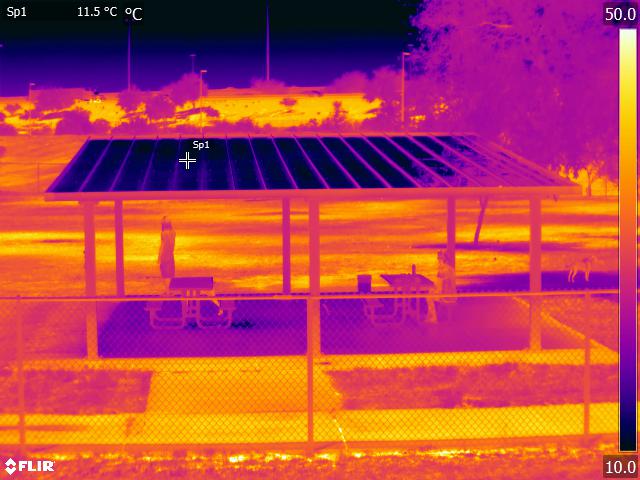Editor’s note: This story is featured in the 2023 year in review.
RJ Dog Park in Phoenix just got a little cooler.
The dog park within the city’s Pecos Park — two acres of fenced-in grass and dirt patches with just a few small trees and little shade — is now home to Arizona’s first "Passive Daytime Radiative Cooling Ramada."
The unique solar-reflective ramada is helping Arizona State University researchers better understand the role "cool" surfaces can play in improving the comfort of people — and their four-legged friends — in public spaces.
The researchers, in collaboration with building materials and adhesives company 3M and the city of Phoenix, are studying the potential to cool airsheds, pedestrians and the global climate by making surfaces more reflective.
The new ramada in the dog park is the first in the state to be coated with Passive Daytime Radiative Cooling, or PDRC, material.
The advanced technological material is designed to have higher solar reflectance and higher thermal emittance than typical roofs, which act like a mirror that reflects back light and shoots off its own energy as heat back into the atmosphere.

Infrared image of the "cool" ramada. The purple, blue and black areas indicate cooler temperatures, showing the roof surface temperature significantly cooler than its surrounding environment. Photo by Dave Sailor
“What we found from initial studies were some pretty substantial positive results in terms of these coated shelters’ ability to provide a better environment for pedestrians,” said Dave Sailor, director of the School of Geographical Sciences and Urban Planning and the principal investigator on the project.
Sailor, the founder and former director of ASU’s Urban Climate Research Center, also led previous smaller-scale studies testing PDRC materials on Tempe bus shelters.
“It reduced what's known as the mean radiant temperature, but also convected much less heat into the urban airshed, so it’s a winning solution from several perspectives.”
Over the course of the summer, ASU researchers will be monitoring heat flux and surface temperature sensors attached to the ramada and the surrounding areas at the dog park to test for three things:
How the material affects the heating of the surrounding environment.
How the material affects the thermal comfort of people nearby.
The potential for widespread use of such materials to impact the global climate.
“We want to see whether using these kinds of films will help us in extreme heat,” said Gina Fagliarone, an architecture graduate student at The Design School in ASU’s Herberger Institute for Design and the Arts who is involved in the project. “By creating a material that has high solar reflectance, we don’t get that same heat sink effect.”
The PDRC coating is designed to have high reflectance and emittance in wavelengths not absorbed by greenhouse gases in the atmosphere like CO2 and water vapor.
The surfaces can emit their own heat directly into space with only partial absorption along the way, removing heat from Earth's system and potentially enhancing a global climate cooling effect.
The work is part of a much larger effort to explore different strategies and technologies to keep Phoenix and other cities worldwide cool.
“There's not a single blanket solution that's going to work everywhere, but by testing these design strategies, we can put together a portfolio of solutions that work well for providing cooling for the Phoenix metro area,” Sailor said.
“We're also simultaneously building relationships with other cities in other countries to try to take what we learned here and apply it more broadly to have more impact.”
And while scientists continue to advance this critical work, one Phoenix dog park is now outfitted with a special ramada and shade, which both canines and their owners can enjoy.
The project is funded in part by ASU’s Healthy Urban Environments collaborative.
More Health and medicine

From lab to startup: ASU researchers drive health innovation
By Emmanuelle ComptonThe future of engineering-driven health innovation is currently unfolding at Arizona State University.In the School of Biological and Health Systems Engineering, part of the Ira…

Creepy-crawly science that matters
Written by Douglas C. TowneWhen Karen Clark was a child traveling with her grandfather, the late ASU Professor Herbert L. Stahnke, she didn’t realize how unusual their evening routines were.“When we…

A new heart
Written by Daniel Oberhaus, ’15 BAEach year, around 1.3 million children are born with congenital heart disorders, malformations that can include missing chambers or misplaced vessels. It’s the most…





